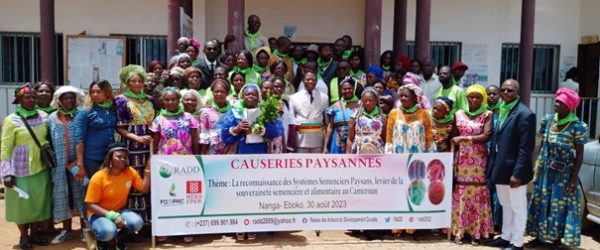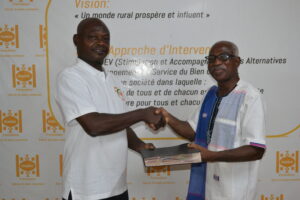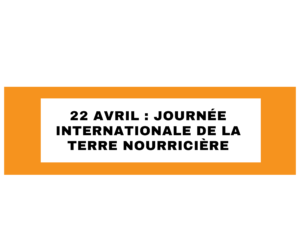Le Réseau des Acteurs du Développement Durable (RADD), Inades-Formation Cameroun, plusieurs autres associations et réseaux de paysan.ne.s membres de la PLANAF-CAM et une centaine d’agro éleveurs se sont réunis le 30 août 2023 à l’hôtel de ville de Nanga Eboko dans le cadre des causeries paysannes sur le système semencier paysan au Cameroun.
La sécurité alimentaire et la lutte contre la pauvreté sont les buts poursuivis par le réseau Inades-Formation, dans le cadre de la mise en œuvre de son Programme « Systèmes alimentaires basés sur l’agriculture familiale et les initiatives de valorisation des semences paysannes ». Ainsi donc, Inades-Formation Cameroun a pris une part active aux causeries paysannes organisées par le Réseau des Acteurs du Développement Durable. Placées sous le thème « La reconnaissance des systèmes semenciers paysans, levier de la souveraineté semencière et alimentaire au Cameroun », les causeries paysannes de Nanga Eboko ont connu faste et solennité. Ces assises avaient pour objectifs de promouvoir l’accès durable à tous les producteurs locaux à la semence paysanne de qualité en quantité suffisante, en vue de garantir l’autonomie semencière du producteur et la souveraineté alimentaire d’une part, et, d’autre part, de contribuer à la reconnaissance juridique des systèmes semenciers paysans (SSP) par l’appropriation de la déclaration d’Esse.
Une table ronde réunissant le représentant du Maire, M. Bessala Nseme Joseph, le Délégué Départemental de l’Agriculture de la ville hôte, les représentants des organisations membres de la PLANF-CAM, les et ceux de la CNOP-CAM et de la Plateforme Régionale des Organisations Paysannes d’Afrique Centrale (PROPAC), le point focal Ressources phyto-génétiques, les chercheursDrs Benoît Likeng et Eone, plusieurs associations d’agriculteurs et l’équipe du RADD, a permis à ces différents acteur.trice.s de débattre sur les défis et enjeux de la reconnaissance d’un système semencier paysan au Cameroun.
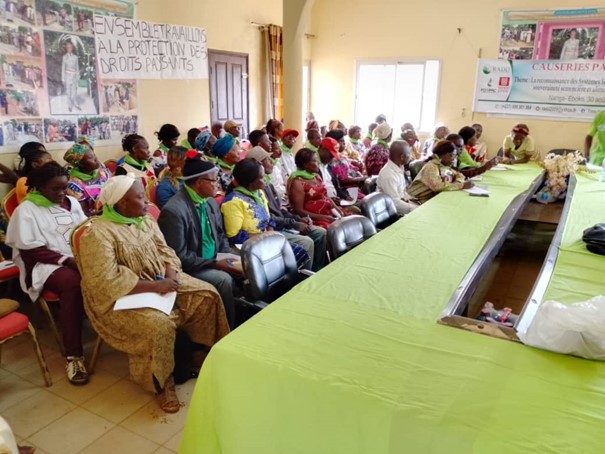
La mise en route des travaux a été marquée par trois allocutions, notamment celle du représentant du Maire de Nanga-Eboko, suivie du Délégué Départemental de l’Agriculture de la Haute Sanaga, et en en dernier ressort le discours d’ouverture de la Secrétaire exécutive du RADD. Les échanges ont porté sur les techniques de production, de sélection et de conservation des semences paysannes par les méthodes ancestrales d’une part, et de l’autre sur l’appropriation de la déclaration d’Esse axée sur la reconnaissance juridique des droits des agriculteurs.trices paysan.ne.s.
A l’issue de ces allocutions s’en sont suivis les travaux en groupes et les séances de restitutions. Les seigneurs de la terre ont, durant ces travaux de groupes, enrichi la déclaration d’Esse qui servira dorénavant de document de plaidoyer auprès des décideurs. Toutefois, « En accompagnant les paysan.ne.s dans la production de semences, il sera également important de mettre en place un dispositif de contrôle à leur niveau pour non seulement garantir la qualité de ces semences, mais également d’assurer la reconnaissance de cette qualité par les utilisateurs qui sont les producteurs eux-mêmes », a souligné la Secrétaire Exécutive du RADD Marie Crescence NGOBO. En réponse à la suggestion de certains participants de tenir une foire à Nanga Eboko, la secrétaire exécutive du RADD a posé comme préalable l’implantation d’une case paysanne et le recensement des semences paysannes locales aux fins de mener des activités de plaidoyer.
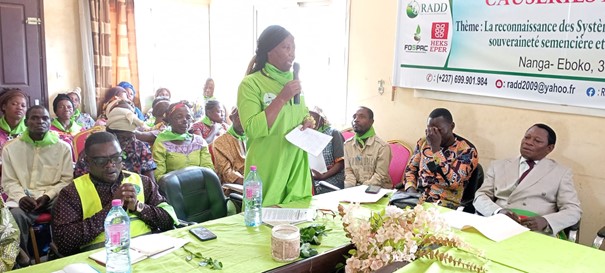
L’autre temps fort des causeries paysannes a été l’échange des semencesentre paysan.ne.s et l’exposition/vente de produits locaux venus de la Haute-Sanaga. De nombreux acteurs de l’agroécologie de toute la zone ont répondu présent ainsi que de nombreux visiteurs (300). Plus de 100 variétés différentes de semences paysannes ont pu être présentées.
Ci-dessous quelques illustrations des semences exposées



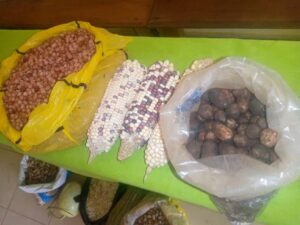
Moment de rencontre et de convivialité, la foire a été l’occasion pour rappeler la réglementation générale relative aux semences (condition de production, certification, garanties et sanctions en cas de violation).
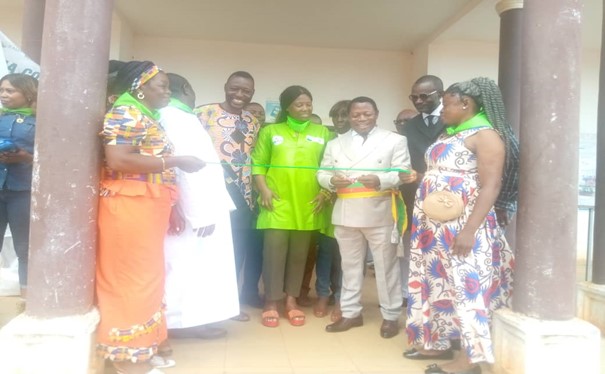
Au cours de l’évènement des « causeries paysannes », l’importance du rôle de la femme rurale dans l’élimination de la pauvreté a été soulignée. Le représentant du maire a, dans son allocution de clôture, appelé les femmes de la Haute-Sanaga à une autonomisation économique. La coordonnatrice et par ailleurs Secrétaire Exécutive du Réseau des Acteurs du Développement Durable, Marie Crescence NGOBO, a renchéri en annonçant la création d’une case de semences paysannes à Nanga Eboko. L’initiative permettra aux femmes d’entreprendre dans les milieux ruraux.
« Nous vous disons gracieusement merci d’avoir répondu présent à cet atelier d’échanges qui nous prépare déjà à notre grand évènement de février 2024 qu’est la foire des semences paysannes du Cameroun ». C’est sur ces mots de fin que se sont clôturées les causeries paysannes de Nanga-Eboko.
Marguerite MOMHA, Communication Inades-Formation Cameroun

